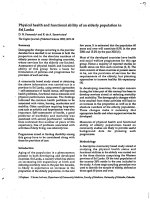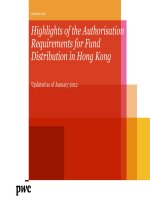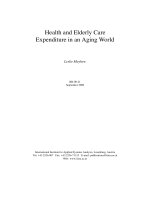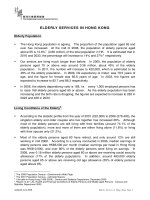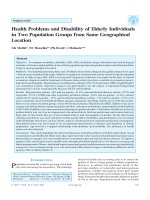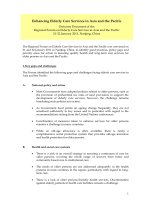ELDERLY SERVICES IN HONG KONG doc
Bạn đang xem bản rút gọn của tài liệu. Xem và tải ngay bản đầy đủ của tài liệu tại đây (141.51 KB, 6 trang )
ELDERLY SERVICES IN HONG KONG
Elderly Population
The Hong Kong population is ageing. The proportion of the population aged 65 and
over has increased. At the mid of 2008, the population of elderly persons aged
above 65 is 12.6%
1
(0.88 million) of the total population in HK. It is estimated that in
2016 and 2033, the percentage will increase to 14% and 27%
2
respectively.
Our seniors are living much longer than before. In 2005, the population of elderly
persons aged 75 or above was around 0.36 million, about 45% of the elderly
population. In 2011, the number will increase to 420,000, which is estimated to be
48% of the elderly population. In 2006, life expectancy of male3 was 79.5 years of
age, and the figure for female was 85.6 years of age. In 2033, the figures are
expected to increase to 82.7 and 88.3 respectively.
In 2006, the elderly dependency ratio is 168, i.e. every 1,000 employed persons has
to raise 168 elderly persons aged 65 or above. As the elderly population has been
increasing and the birth rate is dropping, the figures are expected to increase to 282 in
2023 and 428 in 2033.
Living Conditions of the Elderly
4
According to the statistic profile from the year of 2001 (222,000) to 2006 (279,400), the
singleton elderly and older couples who live together has increased 26%. Although
most of the elderly persons are still living with their families (around 74.1% of the
elderly population), more and more of them are either living alone (11.6%) or living
with their spouse only (21.2%).
Most of the elderly persons aged 60 have retired, and only around 12% are still
working in mid 2008. According to a survey conducted in 2006, median earnings of
elderly persons was HK$6,500 per month (median earnings per head in Hong Kong
was HK$10,000), and over 80% of the elderly persons were living on savings. In
2008, over 0.18 million elderly persons aged 60 or above are receiving social security
allowance (17% of the elderly population). In addition, around 483,000 elderly
persons aged 65 or above are receiving old age allowance (55% of elderly persons
aged above 65).
1
The 2006 Population Census - Government's Web Page
2
The 2001 Population Census - estimated figures
3
Life table in Hong Kong (1996-2029) - Census and Statistics Department, December 2000
Updated June 2009
Elderly Services in Hong Kong Page 1
4
Report no.27: Life, Health and Financial Conditions of Elderly Persons and Middle-aged Persons - Census and
Statistics Department 2000
Nonetheless, those soon-to-be-old (aged 45-59 years old) people are more educated
and are financially more viable. Over 50% of them have secondary school education
or above, whereas 78.7% of those aged over 60 are having primary school education
or below. Besides, one-third of them are having different kinds of retirement
protection, compared to around 16% of those aged over 60.
Health Conditions
5
Most elderly persons are still healthy with over 70% of them are suffering from one
kind of or more chronic illnesses. Among them, the most common illnesses include
hypertension, arthritis, ophthalmology problems, and diabetes.
In 2006, there are about 70000 elderly persons suffering from Dementia who are living
in the community. It is projected that the numbers of demented persons will
significantly increase to 0.33 million by the year of 2050. Among those who are aged
75 or above, about 22% are suffering from cognitive difficulties.
Elderly Service in Hong Kong
6
Since November 2000, the Social Welfare Department has implemented the Standardised
Care Need Assessment Mechanism for Elderly Services. Under the Mechanism, an
internationally recognised assessment tool, Minimum Data Set-Home Care (MDS-HC) is
adopted to ascertain the care needs of elders and match them with appropriate services.
With the implementation of the Central Waiting List for subsidised long term care services,
the Mechanism has since 28 November 2003 been extended to cover eligibility screening
for applications for long term care services.
The Mechanism covers applications for admission to homes for the aged,
care-and-attention homes, nursing homes, day care centres for the elderly, enhanced
home and community care services, and integrated home care services (for disabled and
frail cases). Assessors under the Mechanism are professionals from various disciplines
such as social workers, nurses, occupational therapists and physiotherapists. They are
required to go through training and accreditation on the use of the assessment tool. As at
31 Mar, 2009, we have 2167 accredited assessors.
5
ditto
Updated June 2009
Elderly Services in Hong Kong Page 2
6
Source: Supplementary materials distributed at the briefing session on "Care for Elders" - Policy Objectives
of Chief Executive 2001, by Social Welfare Department, November 2001.
1. Community Support Services
The service objective is to assist elderly persons to remain living in the community for as
long as possible. These services also give support to carers. With increasing diversity
of community support services for the elderly, a more integrated approach to facilitate
access to services will be adopted.
Service Types
Services Provided
Subvented
Units
Neighborhood
Elderly Centre
NEC is a type of community support services at neighbourhood
level which provides a range of comprehensive services to cater
for the psycho-social and developmental needs of both healthy
and mildly frail elders, including, educational and developmental
activities, volunteer development, carer support service,
counseling service, reaching out and networking, social and
recreation activities, meal service, drop-in service, Information and
referral centre on community resources
115
Social Centre
for the Elderly
Social Centres for the Elderly organize social and recreational
activities for elders in the community and to provide information
regarding welfare services for the elders and referral to
appropriate services.
57
District Elderly
Community
Centre
DECC is a type of community support services at district level to
enable elders to remain in the community, to lead a healthy,
respectful and dignified life, to enhance their positive and
contributing role and to involve the public to build up a caring
community. DECC provides services including community
education, case management, support team for the elderly, health
education, educational and developmental activities, information
and referral centre on community resources, volunteer
development, carer support services, social and recreational
activities
meal and laundry services, drop-in service
41
Support Team
for the Elderly
To reach out to single and needy elderly and provide them with
social networking and support service; encourage volunteers to
visit and assist single elderly.
41
Updated June 2009
Elderly Services in Hong Kong Page 3
Service Types
Services Provided
Subvented
Units
Day Care
Centre for the
Elderly
Day Care Centres for the Elderly provide a range of centre-based
care and support services during daytime to enable the frail and
demented elders suffering from moderate or severe level of
impairment to maintain their optimal level of functioning, develop
their potential, improve their quality of life and to enable them to
live in their own homes wherever feasible and possible. Services
provided by Day Care Centre includes nursing care, rehabilitation
training, health education, carer support services, day respite
service, counselling and referral services, social and recreational
activities, meal, transportation service.
58
(2,234
service
quota*
08-09
revised
estimate)
Integrated
Home Care
Service Team
Integrated home care services aims at providing difference kinds
of care and services to the elders, the disabled, individuals and
families with social need.
Services for frail cases
The Integrated Home Care Services Teams (IHCSTs) should
address individual service users’ health concerns and
corresponding needs by applying a multi-disciplinary approach
including nursing care, personal care, rehabilitative service and
social work service etc. A planned and well co-ordinated
package of home care and community care service tailor-made for
individual service user according to their frailty and disability.
Services for ordinary cases including Personal care / simple
nursing care service, general household or domestic duties, escort
service Child-minding, home respite service health/safety, urchase
and delivery of daily necessities, provision of meals and laundry
service.
60
(28,600
service
quota*,
08-09
revised
estimate)
Enhanced
Home and
Community
Care Services
To provide enhanced day and community care services to frail
people suffered from moderate level of impairment, meet their
nursing and care needs and provide support to their carers. The
services including care management, basic and special nursing
care, personal care, rehabilitation exercises, centre-based day
services, carer support services, respite service, out-of-hour
emergency support, environmental risk assessment and home
modifications, home-making service, provision of meals,
transportation and escort service
24
(3,700
service
quota*
08-09
revised
estimate)
Holiday Centre
for the Elderly
To provide holiday facilities in the countryside for elderly people
(including those who need care-and-attention service) to take a
rest and to enjoy pastime with their families and friends.
1
2. Residential Care Services
Updated June 2009
Elderly Services in Hong Kong Page 4
The service objectives are to provide residential care and facilities for those who, for health,
social and other reasons, are unable to live at home, and provide assistance in their daily
living according to their varying personal care needs.
Service Types Services Provided
Capacities
as at 31 March 2009
Hostel for the
Elderly
(will be gradually
phased out and
converted to higher
level of care )
To provide communal living accommodation, various
programmes and care to elderly persons who are
capable of self-care, and yet require support and
guidance in daily living activities.
39
- subvented : 24
- self-financing: 15
Home for the Aged
(will be gradually
phased out and
converted to higher
level of care)
To provide residential care, meals, laundry service, a
limited degree of assistance in activities of daily living,
and social activities for elderly persons who are
unable to live independently in the community.
However, they are not dependent on assistance with
personal or nursing care.
1,891
- subvented : 672
- self-financing: 1,219
Care-and-
attention Home
To provide residential care, meals, personal care and
limited nursing care for the elders who suffer from
poor health or physical/mild mental disabilities with
deficiency in activities of daily living.
23,640
- subvented: 14,375
- self-financing:2,644
- bought place and
enhanced bought
place: 6,621
Nursing Home
To provide residential care, personal care, medical
and nursing care to the elders who, as a result of
deterioration in their health condition, cannot be
adequately cared for in care-and-attention homes.
2,986
- subvented: 2,086
- self-financing:900
Residential
Respite Service
To provide temporary or short-term residential care
service for the elders. It serves the objectives of
providing temporary relief to family members or
relatives who are the main carers of elders requiring a
certain degree of personal care whilst resident in
normal environment within the community.
11 places at 11 homes,
and casual temporary
vacant places at
residential homes
Emergency
Placement Service
To provide a temporary shelter for the elders in urgent
need of accommodation and care.
65 places at 23
homes
International Linkages
International Federation on Ageing
International Association of Gerontology
HelpAge International
Updated June 2009
Elderly Services in Hong Kong Page 5
Future Trends
Meet with the different needs of the future cohort
The new cohort of seniors, being more educated and financially viable, is expected to
have different needs than the current cohort. They would be more active in voicing
out their needs and have different demands on the service contents, models and
qualities. If the future policy requires them to pay more according to their affordability,
their expectations would be even higher.
Establish Long-term Care System
As the number of frail elderly has been increasing, different government departments,
including those concerning health care, medical and welfare services, should work
more closely in providing multi-disciplinary services, and establish a seamless
long-term care system. At present, we will keep on advocating for more community
support services, as well as helping carers to care for their elderly members at home.
Residential services will be provided to frail elderly and those who cannot be
adequately cared for by their families.
Studying the Long-term Care financing arrangement
The aged population is going to reach its peak in the coming decade when the
baby-boomers begin to enter into their old age. Coupled with the low fertility rate,
sustainability of the current Long-term Care financing arrangement will become a
critical concern.
Increase in service varieties
Services for the seniors will become more and more diverse. Some are in response
to the change in policy and some are in response to the changing needs of the seniors.
One of the examples is the transfer of infirmary service from hospitals to welfare sector.
Another is the assisted living housing. This kind of retirement housing integrates
conventional housing and care under one roof.
Service Integration
In future, the development of services for the elderly will adopt the concepts of
continuum of care and service integration. The services will be refocused to provide
the elders with one-stop and professional services, so that they can obtain services at
home or in home-like environment. Programmes include Pilot Project on Continuum
of Care at residential care homes, Enhanced Home and Community Care Services,
and all kinds of integrated community support services for the elders, etc.
Multi-skills Training
As integration becomes the major trend in elderly service, welfare personnel are
required to learn and master different skills and knowledge necessary to provide
quality care to the elders, such as nursing care, psychological and social care of the
elders, etc.
Updated June 2009
Elderly Services in Hong Kong Page 6


